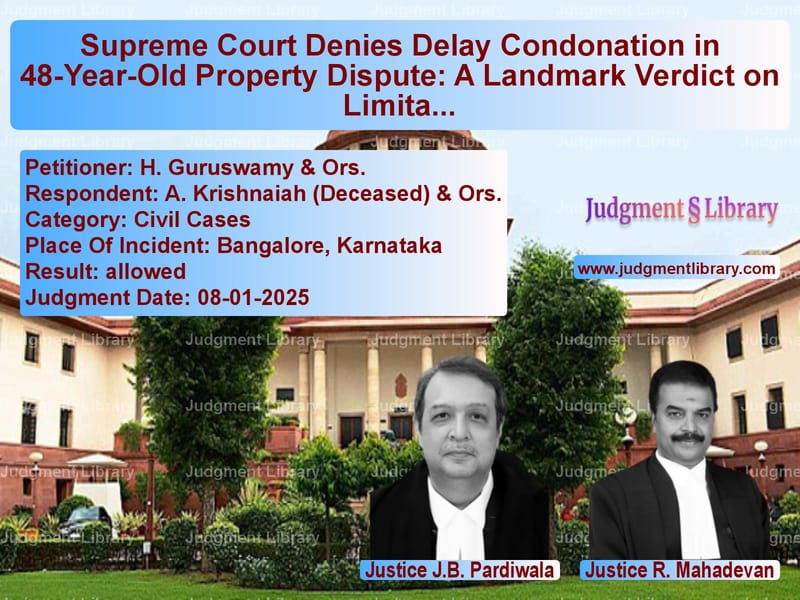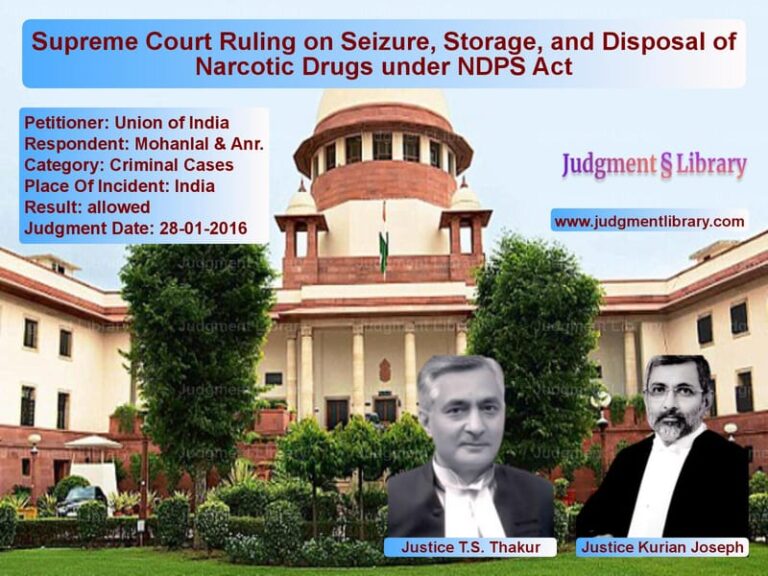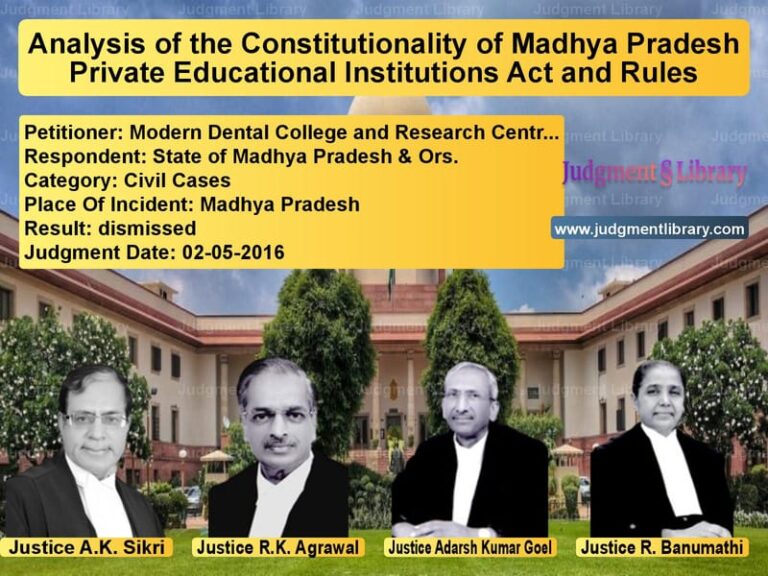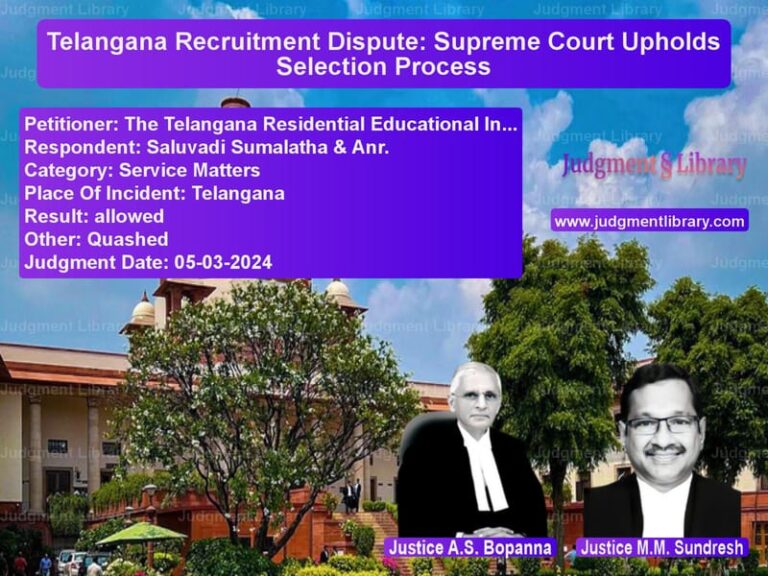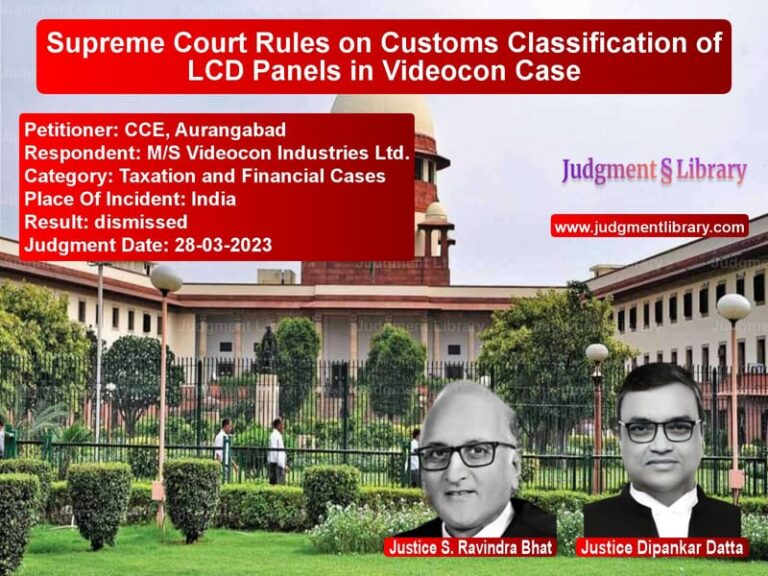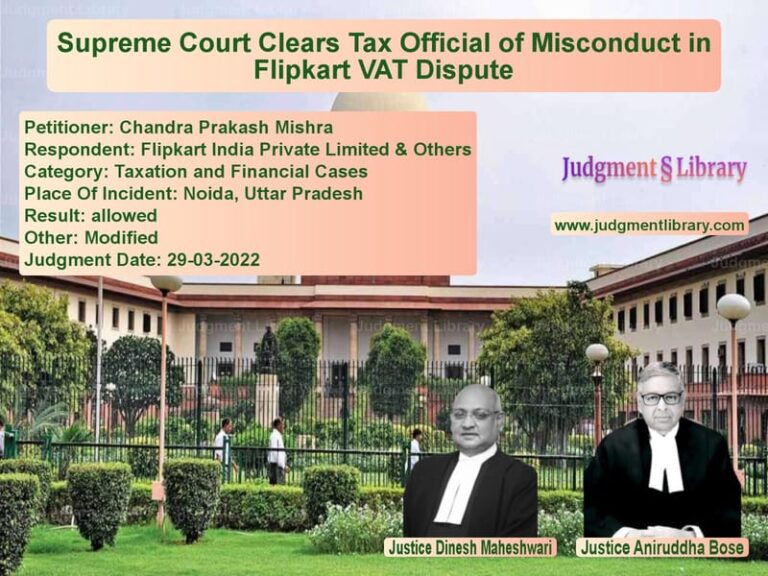Supreme Court Denies Delay Condonation in 48-Year-Old Property Dispute: A Landmark Verdict on Limitation Law
The Supreme Court of India, in a critical judgment, has finally put to rest a 48-year-old property dispute in the case of H. Guruswamy & Ors. vs. A. Krishnaiah (Deceased) & Ors. The case, spanning multiple decades and several rounds of litigation, revolved around ownership claims over a piece of land in Byrasandra, Bangalore, Karnataka. The Court decisively ruled against the condonation of an extraordinary delay of 2200 days, restoring the trial court’s decision to dismiss the respondents’ application.
Background of the Dispute
The dispute can be traced back to a property originally owned by Venkatappa in 1916. Over time, parts of this property were sold, leading to legal complications. The deceased respondent, A. Krishnaiah, claimed to have purchased the disputed property and engaged in a prolonged legal battle to establish ownership.
Krishnaiah’s claims were repeatedly dismissed in multiple suits, yet he continued to file fresh litigations. The key cases in the timeline of this dispute include:
- O.S. No. 33/1971: A suit for specific performance, where the court found Krishnaiah’s purchase to be hit by the doctrine of lis pendens and declared him not to be a bona fide purchaser.
- O.S. No. 104/1972: Another suit filed by Krishnaiah on the same cause of action, dismissed on merits.
- O.S. No. 1833/1980: A fresh suit for possession, which was dismissed for default in 1983 and later abated in 2000 due to the failure to substitute legal heirs.
- Misc. Case No. 223/2006: Respondents sought to revive the abated suit, but the trial court rejected their application, citing excessive delay and lack of valid grounds.
- W.P. No. 7220/2014: The Karnataka High Court condoned a delay of 2200 days, effectively reviving the long-dismissed case.
Supreme Court’s Analysis of the High Court’s Ruling
The Supreme Court scrutinized the High Court’s approach and found serious lapses. The Court expressed its dismay at the manner in which the High Court had overlooked critical legal principles related to limitation:
Read also: https://judgmentlibrary.com/supreme-court-ruling-on-stamp-duty-valuation-in-property-transactions/
“We are constrained to observe that the High Court has exhibited complete absence of judicial conscience and restraints, which a judge is expected to maintain while adjudicating a lis between the parties.”
Key points raised by the Supreme Court in overturning the High Court’s decision included:
- The suit’s prolonged history: The original case dates back to 1977, and over the years, courts had repeatedly rejected Krishnaiah’s claims. Reviving such a case without substantial cause goes against the principles of limitation.
- Failure to act promptly: The respondents failed to bring legal heirs on record despite multiple opportunities, leading to the suit’s abatement in 2000. They took six years to file for recall, showing negligence.
- Violation of legal principles: The Supreme Court reminded that delay condonation is not an absolute right and must be backed by justifiable reasons.
The Supreme Court emphasized:
“The rules of limitation are based on the principles of sound public policy and principles of equity. No court should keep the ‘Sword of Damocles’ hanging over the head of a litigant for an indefinite period of time.”
Legal Principles Applied in the Judgment
The judgment reiterated fundamental legal principles governing limitation and delay condonation:
1. Doctrine of Lis Pendens
The Court reaffirmed that Krishnaiah’s claims were subject to lis pendens, meaning any transactions made during ongoing litigation were void. Despite previous rulings, he continued to pursue litigation without fresh legal basis.
2. Principle of Limitation
Limitation laws exist to prevent perpetual litigation. The Supreme Court held:
“The rules of limitation are not meant to destroy the rights of parties. They are meant to ensure that parties do not resort to dilatory tactics but seek their remedy promptly.”
3. Lack of Due Diligence
The respondents had received certified copies of the dismissal order in 2005 but waited until 2006 to file for recall. The Supreme Court found this delay unjustified:
“The respondents despite having obtained the certified copies on 26.08.2005, had only filed Misc. No. 223/2006 on 03.06.2006 and failed to explain their delay in filing the petition.”
Final Judgment
The Supreme Court allowed the appeal, setting aside the Karnataka High Court’s order and restoring the trial court’s dismissal of the recall application. It ruled:
“The High Court proceeded to condone the delay of about 2200 days without adverting to any of the reasons assigned by the Trial Court while rejecting the application filed for recall.”
This ruling serves as a stern warning against the misuse of the judicial process to prolong unwarranted claims.
Petitioner Name: H. Guruswamy & Ors..Respondent Name: A. Krishnaiah (Deceased) & Ors..Judgment By: Justice J.B. Pardiwala, Justice R. Mahadevan.Place Of Incident: Bangalore, Karnataka.Judgment Date: 08-01-2025.
Don’t miss out on the full details! Download the complete judgment in PDF format below and gain valuable insights instantly!
Download Judgment: h.-guruswamy-&-ors.-vs-a.-krishnaiah-(decea-supreme-court-of-india-judgment-dated-08-01-2025.pdf
Directly Download Judgment: Directly download this Judgment
See all petitions in Property Disputes
See all petitions in Contract Disputes
See all petitions in Specific Performance
See all petitions in Judgment by J.B. Pardiwala
See all petitions in Judgment by R. Mahadevan
See all petitions in allowed
See all petitions in supreme court of India judgments January 2025
See all petitions in 2025 judgments
See all posts in Civil Cases Category
See all allowed petitions in Civil Cases Category
See all Dismissed petitions in Civil Cases Category
See all partially allowed petitions in Civil Cases Category

